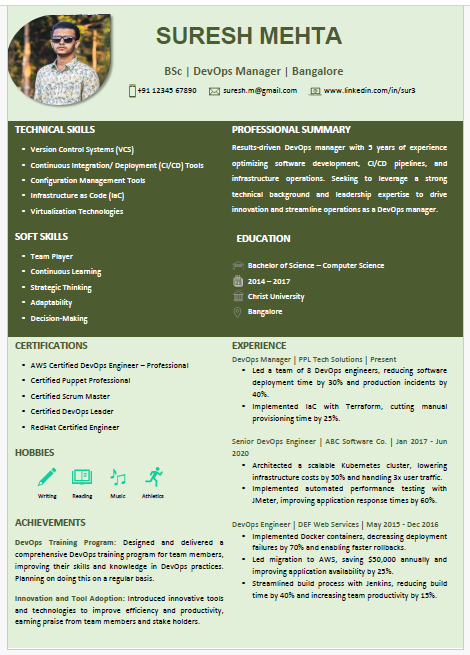DevOps Manager
BSc

About this template
Its clean design ensures easy readability, making it easier for recruiters to quickly assess your qualifications.
This is a very colorful and modern resume which can help you stand out from the competition. Its vibrant design and well-organized layout effectively showcase your skills and achievements, making a lasting impression on potential employers.
Some important and useful technical skills for DevOps Manager
A DevOps Manager needs a range of technical skills to streamline development and operations processes effectively. Here are ten important and useful technical skills for a DevOps Manager:
1. Continuous Integration/Continuous Deployment (CI/CD):
Expertise in CI/CD practices is essential for automating the software development lifecycle. DevOps Managers use tools like Jenkins, GitLab CI, and CircleCI to automate building, testing, and deploying code, ensuring faster and more reliable releases.
2. Cloud Platforms:
Proficiency with cloud platforms such as AWS, Azure, or Google Cloud is crucial. DevOps Managers leverage cloud services to deploy, manage, and scale applications, as well as to optimize costs and ensure high availability and reliability.
3. Infrastructure as Code (IaC):
Knowledge of IaC tools like Terraform or AWS CloudFormation allows DevOps Managers to automate and manage infrastructure through code. This skill ensures consistent and repeatable infrastructure provisioning and configuration.
4. Containerization and Orchestration:
Experience with container technologies such as Docker and orchestration platforms like Kubernetes is vital. These tools help in creating, managing, and scaling containerized applications, improving development agility and operational efficiency.
5. Configuration Management:
Proficiency in configuration management tools like Ansible, Puppet, or Chef enables DevOps Managers to automate and manage system configurations. This skill ensures consistency across environments and simplifies the management of complex systems.
6. Monitoring and Logging:
Skills in monitoring and logging are essential for maintaining system health and performance. DevOps Managers use tools like Prometheus, Grafana, and ELK Stack to monitor metrics, visualize data, and troubleshoot issues effectively.
7. Scripting and Automation:
Strong scripting skills in languages like Python, Bash, or PowerShell are necessary for automating repetitive tasks and managing complex workflows. Automation enhances efficiency and reduces manual intervention.
8. Version Control Systems:
Expertise with version control systems such as Git is fundamental for managing code changes and collaboration. DevOps Managers use Git for source code management, branch handling, and code review processes.
9. Security Practices:
Knowledge of security practices and tools is crucial for ensuring the safety of applications and infrastructure. DevOps Managers implement security measures such as vulnerability scanning, access controls, and encryption to protect against threats.
10. Networking Fundamentals:
A solid understanding of networking concepts, including TCP/IP, DNS, and load balancing, is important for managing and optimizing network configurations. This knowledge helps in troubleshooting connectivity issues and ensuring efficient data flow.
Conclusion:
These technical skills enable a DevOps Manager to integrate development and operations processes effectively, ensuring smooth and efficient software delivery while maintaining system reliability and security.